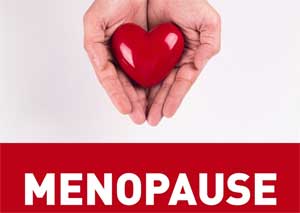- Home
- Editorial
- News
- Practice Guidelines
- Anesthesiology Guidelines
- Cancer Guidelines
- Cardiac Sciences Guidelines
- Critical Care Guidelines
- Dentistry Guidelines
- Dermatology Guidelines
- Diabetes and Endo Guidelines
- Diagnostics Guidelines
- ENT Guidelines
- Featured Practice Guidelines
- Gastroenterology Guidelines
- Geriatrics Guidelines
- Medicine Guidelines
- Nephrology Guidelines
- Neurosciences Guidelines
- Obs and Gynae Guidelines
- Ophthalmology Guidelines
- Orthopaedics Guidelines
- Paediatrics Guidelines
- Psychiatry Guidelines
- Pulmonology Guidelines
- Radiology Guidelines
- Surgery Guidelines
- Urology Guidelines
Levels of sex hormones determine risk of heart disease in post-menopausal women

The risk for CVD in women increases dramatically after the age of 50, before which the women are at much lower risk for CVD as compared to men. Previous studies have demonstrated an association between higher androgen and lower estrogen levels with risk factors for heart disease in post-menopausal women. However, other studies show conflicting results, so the relationship between cardiovascular events and sex hormones post-menopausal women remains vague.
In this study, which is one of the largest and among the longest follow up of studies of this kind, researchers used data from the Multi-Ethnic Study of Atherosclerosis (MESA) to evaluate the association of sex hormone levels with incident CVD, CHD and HF over a 12-year follow-up in 2,834 post-menopausal women free of cardiovascular disease at baseline.
Sex hormone concentrations were measured using fasting serum samples. Every nine-12 months, participants or their next of kin were interviewed over the telephone regarding hospital admissions, outpatient cardiovascular diagnoses and procedures, and death. Hospital records were obtained for 98 percent of reported hospitalized cardiovascular disease events and some medical record-based information was obtained for 95 percent of outpatient encounters.
Key Findings:
- A higher testosterone to estradiol ratio was associated with an elevated risk of incident CVD, CHD, and heart failure.
- Higher total testosterone was associated with an increased risk for coronary heart disease and total CVD (defined as coronary disease plus stroke events), while higher estradiol levels were associated with a lower risk of coronary heart disease.
- The risk for cardiovascular disease and coronary heart disease were approximately linear across the range of total testosterone, testosterone to estradiol ratio and estradiol levels, but there was a U-shaped associated between testosterone to estradiol ratio and heart failure with the extreme ends at a higher risk for heart failure.
"Although sex hormone levels may be linked to future cardiovascular events, it is unclear what the best intervention is to modify sex hormone levels for risk reduction," said Dr. Michos. "However, a sex hormone profile higher in male hormones may identify a woman at higher risk for cardiovascular disease who may benefit from other risk reduction strategies."
Based on the study, the authors concluded that among post-menopausal women, a higher testosterone/estradiol ratio was associated with an elevated risk for incident CVD, CHD, and HF events, higher levels of testosterone associated with increased CVD and CHD, whereas higher estradiol levels were associated with a lower CHD risk. Sex hormone levels after menopause are associated with women’s increased CVD risk later in life.
For more information click on the link: 10.1016/j.jacc.2018.01.083

Disclaimer: This site is primarily intended for healthcare professionals. Any content/information on this website does not replace the advice of medical and/or health professionals and should not be construed as medical/diagnostic advice/endorsement or prescription. Use of this site is subject to our terms of use, privacy policy, advertisement policy. © 2020 Minerva Medical Treatment Pvt Ltd